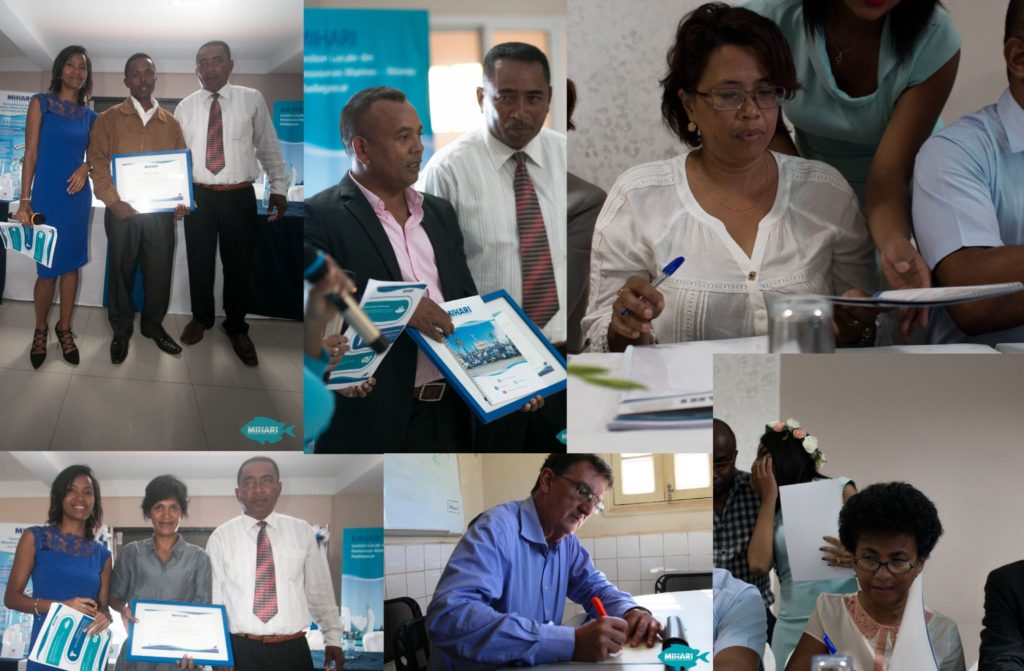23 organisations adopt the MIHARI charter
The sixth of March 2018 will forever be a memorable date in MIHARI’s journey, as 23 conservation organisations from across Madagascar officially signed the network’s charter.
The annual MIHARI Network Coordination Meeting was held on 6-7 March 2018 at the hotel "Le Pavé" in Antananarivo. During this meeting, presentations were given that summarised both the achievements in 2017 and the activities planned for 2018, in order to encourage the involvement of the organisations within MIHARI. The highlight of this meeting was the adoption of the Network Charter, which symbolises the formal affiliation of these 23 organisations as members of the MIHARI Network.
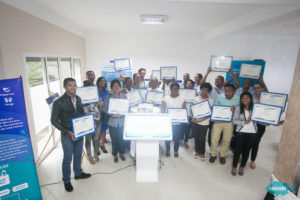
MIHARI: one of the pillars of marine and coastal resources management in MadagascarCreated in 2012 following an initiative that brought together 55 community members from 18 LMMAs across Madagascar, MIHARI has been driven from the outset by the efforts of fishers, and has been supported by marine conservation organisations.
In its six years of existence, MIHARI has been able, thanks to the unwavering support of its member organisations, partners and especially the fishing communities throughout Madagascar, to plot the future of the network.
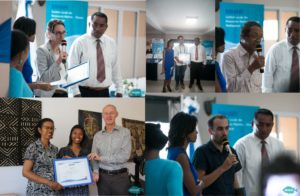
"At first MIHARI seemed an abstract initiative, and a little crazy, but congratulations are in order, because today we have achieved something concrete. We hope that it continues to develop and that it does not remain only at the level of Madagascar but that it becomes a model for the rest of the world” said Alison Clausen, the Regional Director of Wildlife Conservation Society (WCS) in Madagascar, an organisation that has been involved with the network from the beginning.
PAGE/GIZ has also shown its total commitment to the network: "Until 2020, at the end of the PAGE programme and beyond, we are counting on the achievement of MIHARI's strategic priorities, especially in terms of marine resources management. We are convinced that this is the most appropriate initiative to ensure the sustainability of natural resources, one of the objectives of our programme," said Rindra Rakotoharifetra, PAGE/GIZ technical advisor.
Opti'Pousse Haie (OpH), represented by Anthony Bracke, adds: "MIHARI has helped us greatly. We have fairly limited resources and belonging to the network encourages us a lot. Communities that come back from MIHARI events are leaders who are listened to and have the confidence of their peers."
As well as these three longstanding members of the network, other organisations that have joined more recently also explained their choices.
For Durrell, Hasina Randriamanampisoa, said: "Apart from the invitation of many organisations, what has most encouraged us to integrate into the network is MIHARI’s special position, being one of the rare initiatives that raises the voices of neglected, forgotten and vulnerable people."
Louvain Coopération also began its collaboration with the network more recently, after discovering the existence of the network through exchanges with other organisations involved in conservation in the Menabe region. "Joining MIHARI is of great value for us and for the communities we support, and it is a logical continuation of the networking and synergy that we have always applied in our working methods", said Jean Patrick Masquelier, National Director of the Louvain Coopération.
Roger Edmond, a member of the National Museum of Natural History (MNHN) staff, said: "Our first meeting with the network took place when we carried out a project on dugongs. We joined MIHARI after the Fort Dauphin Forum in 2017, because we felt that communities became more engaged. Also, in the motions adopted at the forum, there is a section entirely dedicated to the financial sustainability of fishers. This was the trigger, and we thought that we should not wait a moment longer to join the movement. "
MIHARI: a network for building the capacity of communities and supporting organisations
MIHARI's activities are primarily community-oriented. However, organisations like Community Focused Conservation (C3) in Madagascar have testified that belonging to the network has improved the way they work. "For me personally, for C3 and for the communities we work with, MIHARI has brought a lot. Its exchanges and training have strengthened our capacity in terms of approach and good practices. The latter have allowed us to succeed in the implementation of our projects. Obtaining funding is not the only guarantee of achieving the objectives we have set. In MIHARI, we find collaboration, the sharing of good ideas and practices, and especially solidarity. That's what it's all about," said Lalarisoa Rakotoharimino, Programme Coordinator of C3 Madagascar and Indian Ocean Islands Programme.
For SAGE (Support Service for Environmental Management), Tahiana Razafindralambo said: "For us, MIHARI is a homecoming. We have diversified our activities for a number of years, but since joining the network, we have focused on our passion and our identity: the marine and coastal ecosystem. Today we are more than happy that the long-standing collaboration is confirmed."
Sariaka Rakotondrazafy, from NGO Fanamby, said: "Thanks to our integration and collaboration with the network, communities are becoming more dynamic, particularly in terms of the application of local conventions (dina). We hope that our collaboration will endure, for the long-term protection of Madagascar's marine resources.”
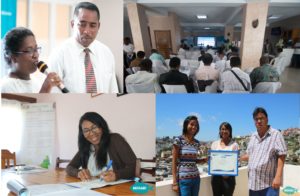
2017 Fort-Dauphin National Forum: an important milestone for the network
MIHARI reached a milestone in July 2017, when 250 participants, including 173 representatives from LMMA communities, met for the fourth MIHARI National Forum in Fort-Dauphin in southern Madagascar. Camille Rabezafy, President of the Committee for Orientation and Support of Protected Areas (COSAP) in Sahamalaza, shared his thoughts about the National Forum: "It particularly touched me to see so many fishers, who have never left their village, travel to Fort Dauphin. It is absolutely necessary to unite the fishing communities along the 5,200 km coast of Madagascar”.
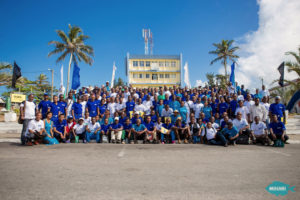
For the host communities, the emotion was also strongly felt. Toky Hasina Sylvestre, of Aquatic Service, said that "having hosted a MIHARI National Forum is one of the most rewarding achievements to date. It was a big challenge. As an result, this forum has strengthened the vitality of the entire southwest region, and in particular the fishing communities of Fort Dauphin".
For SEED Madagascar (Sustainable Environment, Education & Development in Madagascar), the fourth National Forum was a complete success. Having spoken at Sainte-Luce, one of the sites visited during the forum, Mbola Sylvestre of SEED Madagascar said "this was a first in the history of our 19 years of working in Sainte-Luce! The local communities are also satisfied and honored that such a strong delegation of fishing communities from across the island has visited their village."
For the majority of participants, this event was, first and foremost, a great adventure. "It took us 83 hours to travel the 2,000 km from Sainte-Marie to Fort-Dauphin, using several different means of transport,” said Henintsoa Ramanana from Cetamada, “in the famous ‘Karandal’, this big one-of-a-kind bus, someone was always having to take a break to stretch out a bit every couple of hours!"
Beyond these testimonies and anecdotes, everyone will remember the fourth National Forum as a historic milestone for the MIHARI network. It was during this forum that the General Assembly adopted the documents formalising the operation of the network – strategies, charter and structure. In a united and strong voice, the small-scale fishers representing Madagascar’s LMMAs addressed the Government of Madagascar, expressing their grievances, challenges and concerns. "It was fantastic to see representatives from 173 communities agree on a text for presentation to the national authorities" said Jean-Phillipe Palasi, Madagascar Country Director for the NGO Blue Ventures. José Randriamampionona of SAHI (Sehatra Ampandrosoana Haingana and Ivom-paritra) added, "we were fascinated by the fishing communities who were valiantly preparing to speak with the representatives of the Government of Madagascar."
Affiliation of the organisations was just a step: the best is yet to come
MIHARI is nurturing a Malagasy civil society movement that fights for a better future for the country’s small-scale fishers. This movement requires the commitment and support of many stakeholders, and in signing the MIHARI charter the 23 member organisations have shown their support for the network's future. Another charter will be developed for fishing communities and for state partners.

Roberto Komemo from Reef Doctor wants the communities to be recognised as well: "I am impressed by the dynamism of MIHARI. I hope that with this initiative, the LMMA communities will gain strength and become more involved."
Vony Ramino from Asity Madagascar: "MIHARI’s importance is well established. Our two field sites are located on the coast and thanks to the MIHARI membership, we will strengthen our intervention in terms of marine conservation."
Mamy Rakotoarijaona, Director of Operations of Madagascar National Parks (MNP) expressed his vision and hopes for MIHARI in 2018: "For MIHARI to progress and grow, for the fish to grow in number and size, and for LMMAs to be well protected and have a positive impact for the local and surrounding communities."
According to Norotiana Mananjean from the Development and Environmental Law Center (DELC): "The existence of MIHARI is very important. DELC works in the field of laws and legislation in both the private and the environmental sectors. The soul of this network is especially its members who are passionate and committed. This nourishes our hope in the sustainable management of the sea and its resources."
C3, like all organisations working closely with Madagascar’s small-scale fishers, was convinced that it is necessary to improve the standard of living of fishers in Madagascar. "I hope that the MIHARI network will strengthen and broaden its impact, particularly in terms of the financial viability of communities, one of the points in MIHARI's vision that is most important to me. That MIHARI become a lever for the promulgation of laws, the capacity building of LMMA leaders and the collaboration with the authorities ".
The World Wildlife Fund (WWF) Country Director Madagascar, Nanie Ratsifandriamanana summarised in her wishes: "Unity is strength, and that is what MIHARI reflects. We want the local communities, the soul of this platform, to strengthen and carry their own voices ".
For the promising future of MIHARI, Gret, through one of its collaborators, Albert Rakotonirina, shared his wish: "Madagascar is surrounded by sea so it is time that MIHARI also surrounds all of Madagascar"
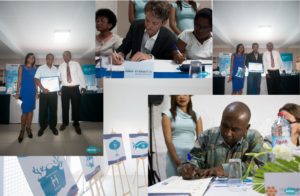
Uniting and collaborating is the best way to ensure a sustainable future for Madagascar's marine resources. MIHARI, helping LMMA management communities work together since 2012, is already demonstrating the effectiveness of this approach for the development of Madagascar through the sustainable management of its resources.
MIHARI advocates inclusion, integrity, mutual support, commitment, responsibility, accountability, solidarity and sharing.
The MIHARI family is continuing to grow – join the movement, we welcome you with open arms! The story does not end here!

